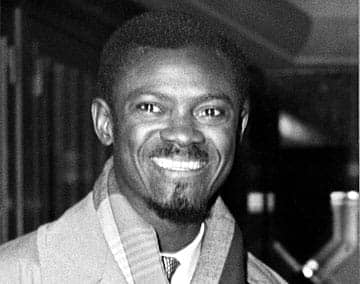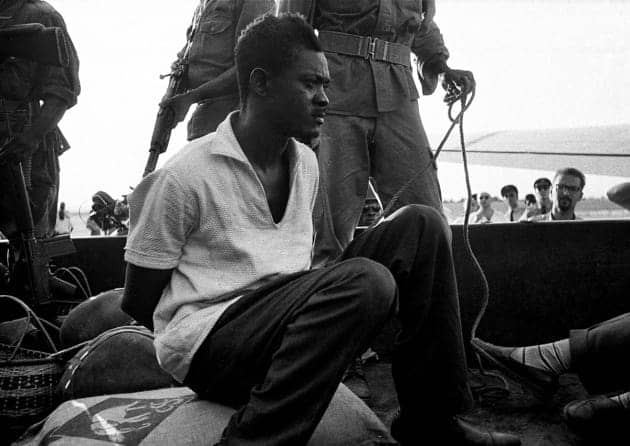by Jean Shaoul
A senior British politician has revealed Britain’s involvement in the 1961 assassination of Patrice Lumumba, the Congo’s first prime minister.
The leader of the Congolese independence struggle from Belgium was brutally murdered just seven months after taking office on the direct orders of the U.S. and Belgium. Britain, whose involvement had long been suspected, also had a hand in it.

The killing demonstrated the fraud of independence for the former colonial countries in Africa. The Congo was and remains today a poor but vastly underdeveloped country, despite its enormous mineral resources, including uranium, copper, gold, tin, cobalt, diamonds, manganese and zinc.
When the million-strong Congolese working class, second only in size to that in South Africa, organized mass strikes and demonstrations in 1959, Belgium moved swiftly to grant the country independence in the hope that the national bourgeoisie would be more able to restore calm. It organized the transfer of power in such a way as to ensure that “independence” would be a formal fiction. The Western corporations’ ownership of the Congo’s vast mineral wealth meant that the imperialist powers were determined to keep control over the country after independence.
But the political situation spiraled out of control when Lumumba imposed import tariffs and forcibly broke up strikes by workers in Leopoldville (Kinshasa). Black troops mutinied against the Belgian officers Lumumba left in command of the army after independence. Moise Tshombe, acting to protect Western mining interests and the Belgian military, seized control of the resource-rich Katanga province and declared Katanga’s independence. Another secession movement developed in the mineral-rich province of Kasai. Belgium sent its army back into the former colony, supposedly to protect its nationals.
Lumumba threatened to appeal for Soviet aid as a means of freeing the country from domination by Belgian mining interests and Belgian troops. Washington used this as the pretext for allying with Belgium to seek his elimination. When Lumumba invited in United Nations peacekeeping forces, they too subordinated themselves to the machinations of Belgium and the U.S., refusing to take any action to prevent the murder of the new prime minister.
The killing demonstrated the fraud of independence for the former colonial countries in Africa.
Lumumba was assassinated as the direct result of orders from the Belgian government and the Eisenhower administration, acting through the Central Intelligence Agency (CIA) and local clients financed and “advised” by Brussels and Washington. In 2001, the U.S. government released archive material related to the Kennedy assassination that included an interview with the White House minute-taker under the Eisenhower administration, Robert Johnson. According to Johnson’s account, in a meeting held with security advisers in August 1960, two months after Congo became independent, President Eisenhower ordered the CIA chief Allen Dulles to “eliminate” Lumumba so that the Congo did not become “another Cuba.”
“There was a stunned silence for about 15 seconds and the meeting continued,” Johnson recalled.
Dulles referred to the Congolese leader as a “mad dog.” A week later, he cabled station chief Larry Devlin authorizing the “removal” of Lumumba, up to and including his assassination.
A telegram sent three months before Lumumba’s death by Count Harold d’Aspremont Lynden, then minister for African affairs, to Belgian officials in the Congo stated, “The main aim to pursue in the interests of the Congo, Katanga and Belgium is clearly Lumumba’s definitive elimination.”
Lumumba had already been deposed and placed under house arrest. The meaning of these words was absolutely clear – it was an order to assassinate him.
In November 2001, 40 years after the event, an all-party commission of enquiry acknowledged Belgium’s role in Lumumba’s murder.
Britain too, fearful for its substantial interests in neighboring Southern Rhodesia, now Zimbabwe, endorsed the assassination. A British Foreign Office document in September 1960 notes the opinion of a top ranking official, who later became the head of MI5, Britain’s domestic intelligence agency, that “I see only two possible solutions to the (Lumumba) problem. The first is the simple one of ensuring (his) removal from the scene by killing him.”

Walton served until 2009 as research assistant for Professor Christopher Andrew’s authorized and sanitized official history of Britain’s domestic intelligence service MI5, “Defense of the Realm.”
In “Empire of Secrets,” Walton claims – despite the evidence – that it is unclear who organized Lumumba’s assassination and that the jury was still out on Britain’s role. Walton wrote, “The question remains whether British plots to assassinate Lumumba … ever amounted to anything. At present, we do not know.”
Lord Lea replied, citing a conversation he had had with Baroness Daphne Park a few months before she died in 2010: “Actually, in this particular case, I can report that we do. It so happens that I was having a cup of tea with Daphne Park … She had been consul and first secretary in Leopoldville, now Kinshasa, from 1959 to 1961, which in practice (this was subsequently acknowledged) meant head of MI6 there. I mentioned the uproar surrounding Lumumba’s abduction and murder and recalled the theory that MI6 might have had something to do with it. ‘We did,’ she replied, ‘I organized it.’”
She had claimed that if the West had not intervened, Lumumba would have handed over Congo’s – now the Democratic Republic of Congo – rich mineral deposits to the Russians.
When asked by The Hindu for further evidence substantiating such allegations, Lea replied, “That’s the conversation I had with her and that’s what she told me. I have nothing more to add.”
In an interview with the Times, Walton called on MI6 to declassify its internal archives on Lumumba. He said that MI6 must be placed “in the position it deserves in the history of anti-colonial movements in Africa and elsewhere.” This could only be done if MI6 “releases records from its own archives.”
He added that Lord Lea’s claim about the involvement of MI6 in Lumumba’s assassination was “an interesting twist in this story,” but that with the release of MI6’s records, such claims would be “impossible to substantiate.”
MI6 refused to comment on Lea’s revelation. An official said, “We don’t comment on intelligence matters.”
In an interview with the Daily Telegraph 10 years ago, Park said that in every posting in the intelligence agency she had two roles – as a diplomat, answerable to the Foreign Office and as an intelligence officer, reporting to MI6. “You do an ordinary job with an extra dimension,” she explained.
She added that she had smuggled Lumumba’s private secretary – who wanted to defect – across the border under a blanket in the boot of her car.
Following Lumumba’s assassination and the war against secessionist Katanga, the Congo was ruled for decades by the reactionary dictator and kleptocrat, Joseph Sese Seko Mobutu, a U.S. stooge, who systematically looted the country. Following the overthrow in 1997 of his debt-ridden regime, which had outlived its usefulness to Washington, the Congo has been subject to a horrific civil war whose resulting dislocation, famine and disease have killed more than 5 million.
Jean Shaoul, a professor at Manchester University, can be reached at jean.shaoul@mbs.ac.uk. This story first appeared on the World Socialist Web Site.





